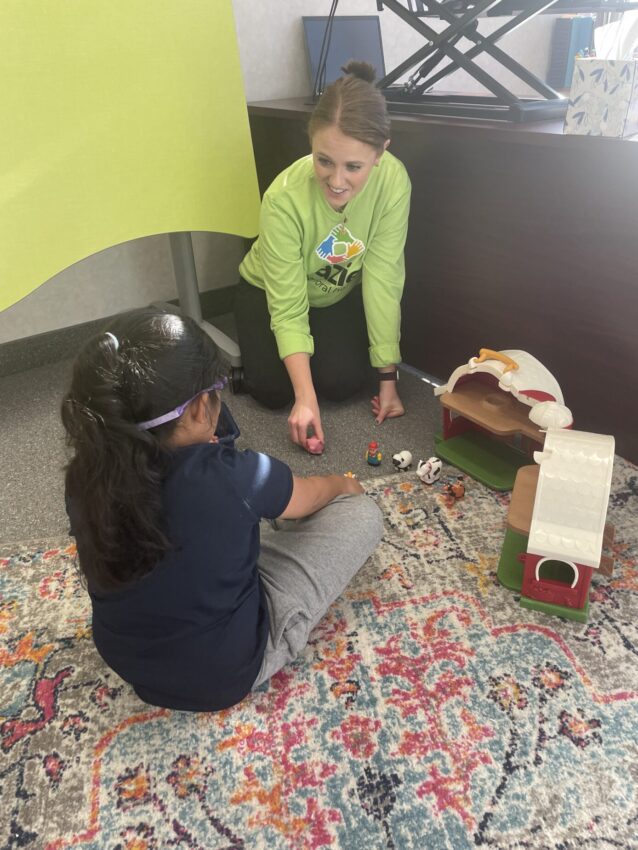November 29, 2022, Cleveland Scene
Cleveland, OH -By Alli Frazier, CEO of Frazier Behavioral Health and Autism Mom.
Featuring Sara Rossman, Speech-Language Pathologist at Frazier Behavioral Health.
Often children and adults can struggle to think of the golden rule about treating others the way you want to be treated. That is why for this Q&A style Ask Alli segment, I am talking to a good friend and colleague of mine, Sara Rossman, who is a licensed speech-language pathologist at Frazier Behavioral Health. She has over six years of experience in the field. She will answer the most important questions about perspective-taking and offer advice for anyone living or working with kids with perspective-taking challenges.

Q: What is perspective-taking?
Perspective-taking is the ability to view a situation from another person’s viewpoint; usually, that means a viewpoint different from our own. Looking beyond your own viewpoint allows you to consider how someone else might feel about a situation, and once you understand how someone feels, you can then change your behavior to help them and yourself!
Q: Why is perspective-taking important?
Perspective-taking is important because this is one of the primary skills people use to relate to each other. Whether building friendships and relationships or thinking about how we make others feel, strong perspective-taking skills make others want to continue interacting with us. Perspective-taking is a skill people use every day; therefore, ensuring it is developed early in a child’s development can help improve overall growth and lead to better outcomes.
Q: Who struggles with perspective-taking?
Though anyone can struggle with this skill, research suggests that children with ADHD and autism tend to the most. An individual with autism may have difficulty with perspective-taking due to a lack of ability to infer other people’s mental states, such as thoughts, beliefs, desires or intentions. Whereas the reason someone with ADHD might struggle is a result of executive function challenges or lack of attention to socially relevant details.
Q: How can parents or people working with children help teach this skill?
I think it is vital for parents and those working with kids to look for the “teachable moments,” whether at home, in the community, or at school. For example, if you see a situation arise where a child with autism doesn’t want to share a toy with a sibling, friend, or classmate and is getting upset, it is important to talk about how the actions of one child can affect the other. However, the most essential part relates the emotion back to a time the child with autism felt the same way. It is important to remember that adding an explanation can be hugely influential. Consider saying something like, “Remember when your friend took your snack and refused to share, and you told me you felt upset? When you didn’t share your toy with your friend, that made them feel the same way.”
Another way to help teach perspective-taking is modeling. We can label our behaviors during interactions. We model perspective-taking if we use flexible thinking or consider others’ thoughts and opinions and label those behaviors. A cool way to teach perspective-taking is through watching movies or reading books. For example, explaining that a character is feeling a particular emotion can help a child see that behavior and emotion in a fun and often exaggerated way. The benefit of the exaggerated emotions in movies or books is that it is often easier for a neurodiverse individual to understand, especially if the tv show or book is a special interest.
Q: How do speech-language pathologists work on developing this skill in therapy?
Speech-language pathologists can help develop perspective-taking skills, among many others, by writing goals and then developing therapy activities that break down a given skill into multiple, more digestible parts. Beyond their work with speaking skills, speech-language pathologists do a great deal of work with kids by helping them analyze different social scenarios. For instance, they can teach kids to be “social sleuths,” or someone who can search for clues to better understand others’ emotions by observing their facial expressions, body language, and behaviors and listening to what they are saying.
Are you a parent, caregiver, or educator interested in a child or someone you know receiving evidenced-based individualized speech-language therapy from Sara Rossman or another great speech-language pathologist? Contact Alli Frazier’s company Frazier Behavioral Health, a behavioral health clinic that focuses on the person and helps children and adults with behavioral, social, communication, and sensory issues at FrazierBH.com/Scene.
Can’t get enough of Ask Alli? Check out previous Ask Alli segments on the Cleveland Scene website by clicking here and look for the upcoming Ask Alli TV segment on December 12 at Facebook.com/FrazierBehavioralHealth.
To read the full article on Cleveland Scene click here.
